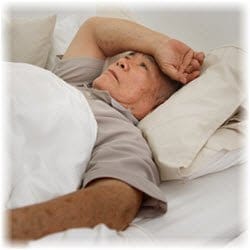Resolve to Better Sleep
 Feel like you’re dragging through the day even after what you think was a good night’s sleep? Do you take a nap as often as you did when you were a child? Occasional daytime sleepiness is a common occurrence, but when you find your fatigue is getting in the way of everyday life, it’s time to get to the bottom of what’s going on.
Feel like you’re dragging through the day even after what you think was a good night’s sleep? Do you take a nap as often as you did when you were a child? Occasional daytime sleepiness is a common occurrence, but when you find your fatigue is getting in the way of everyday life, it’s time to get to the bottom of what’s going on.
The most obvious reason for feeling tired during the day is not getting enough sleep at night. Other reasons for daytime fatigue may be related to your diet, a lack of physical activity or being overweight. Medication side effects can cause you to feel tired—so can stress or depression.
Other causes of your unrelenting sleepiness may be related to the following health conditions or other serious medical conditions. If you find that you often feel tired, it may be time to consult your doctor.
Sleep Apnea
If you regularly feel tired after a full night’s sleep, you may have a sleep disorder such as sleep apnea. This is a potentially serious condition in which your breathing repeatedly stops while you sleep. If left untreated, sleep apnea can increase your risk of high blood pressure, stroke, heart attack, heart failure and diabetes, as well as other serious health conditions.
It is estimated that about 1 in 15 adults in the U.S. have sleep apnea, but approximately 80% of them are undiagnosed. Signs of sleep apnea include loud snoring, gasping for air during sleep, morning headache, waking up with a dry mouth, irritability, difficulty concentrating and excessive daytime sleepiness. If these symptoms sound familiar, talk to your doctor who may order a sleep study to check for this disorder. Treatment for sleep apnea typically involves using a continuous positive airway pressure CPAP machine or wearing an oral device to keep your upper airway open while you sleep.
Chronic Fatigue Syndrome
Although there is no test that can specifically identify chronic fatigue syndrome, it may be diagnosed by ruling out other health problems that cause you to regularly feel excessively tired over a long period of time (at least six months). It is not known why this occurs and there is no cure. Treatment primarily involves finding ways to live with the condition and providing symptom relief.
Fibromyalgia
Not only do people with fibromyalgia experience extreme fatigue, but they may also have widespread musculoskeletal pain, as well as issues with memory and mood. The symptoms may appear after a specific event or they may develop gradually. There is no cure for the condition and treatment is focused on controlling symptoms through medication, relaxation, physical activity and stress reduction.
If you find that you’re often not sleeping well or feel like you constantly don’t get enough sleep, consult your doctor or Primary Care Physician. To find a doctor at PIH Health, go to PIHHealth.org/Find-a-Doctor.
Tips for Occasional Insomnia
Here are a few tips that may help you sleep better at night if you’re not suffering from any of the previously mentioned conditions or find that you occasionally suffer from insomnia:
- Cut back on blue light exposure in the evening: The most common and biggest source of blue light is electronic devices such as cell phones, computers and television screens. Limiting your use of these devices at the end of the day may help you get better sleep at night.
- Don’t consume caffeinated drinks at the end of the day. Caffeine is known to stimulate your nervous system and can prevent your body from naturally relaxing at night before and during sleep.
- Don’t take long naps throughout the day. Long naps can disrupt your body’s sleeping schedule and make it nearly impossible to have a good night’s rest.
- Put effort into making your bedroom a comfortable place to sleep. Investing in new pillows, a mattress or sheets can increase comfortability and help you sleep better at night.
Try implementing some of these tips to help you get better sleep at night. But as always, if you find that you’re always tired, can’t seem to get a good night’s rest, or suffer from chronic insomnia, contact your Primary Care Physician (PCP). If you don’t already have a PCP, visit PIHHealth.org/Find-a-Doctor.
Copyright 2021 © Baldwin Publishing, Inc. All rights reserved. Health eCooking® is a registered trademark of Baldwin Publishing, Inc. Cook eKitchen™ is a designated trademark of Baldwin Publishing, Inc. Any duplication or distribution of the information contained herein without the express approval of Baldwin Publishing, Inc. is strictly prohibited